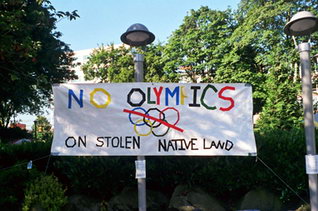The right to the right to practice ones’ own culture and customs including language and religion is a right which has been violated in atrocious ways. Obviously the cultural integrity of the First Nations people in Canada is incredibly important in order to preserve their sacred history. One of the many violations made to the right to practice one’s own culture and religion, is the system of residential schools. These schools have caused an astounding degree of physical and psychological damage to individuals and to communities. Not only have the victims of these schools suffered, the trauma has been absorbed by second generations.
An example of the second generation trauma can be explained through essays such as Roberta Stout and Sheryl Peters , “Inter-generational Effects on Professional First Nations Women Whose Mothers are Residential School Survivors.
There is a link between these past violations (residential schools), and present ones (Kinder Morgan project). This can be explained through the similarities of the cultural disregard. The abuse of the Aboriginal Rights are very much the same with different effects and different consequences. The attitude of the opposing groups however, seem universal they are terribly dismissive and blind to the importance of Aboriginal Rights.

Link to Pdf of the paper.
Another example of post generational effects of the Residential School System in British Columbia, is the creative response, The Witness Blanket by Kwagiulth artist Carey Newman.
Other ways which the practice of Indigenous Culture has been compromised, is the use of the cultural symbols in the 2010 Winter Olympics. This is an example of cultural appropriation and is incredibly offensive to the First Nations groups both in British Columbia where the Olympics were held, and the Inuit communities where the cultural images were taken from and mis-represented.
Tourism has and will always be an incredibly profitable sector of any economy. With a profit driven corporate mindset, some institutions overlook the significance of and dangers related to exploiting cultural history for the sole purpose of tourism and advertising. As a global problem, cultural appropriation can be witnessed in many places in many forms, I will explain the issues as well as here at home in Vancouver.
In Vancouver, we can note our own experiences with cultural appropriation. Being the host city for the Winter Olympics in 2010 was an excellent opportunity for Vancouver to display the rich cultural diversity that can be found within the heart of the city.

Unfortunately the planners decided to fabricate an image of who Vancouverites are, which would then represent the city. This image was created by taking aspects from different aboriginal cultures and communities across Canada and presenting them as the “culture” of Vancouver.
Not only were the Olympics highly controversial as the majority of the First Nation’s community in BC opposed the games being hosted on stolen land, they also offended the First Nation’s of BC as the symbolic Inuksuks used for the advertising and marketing of the Olympics is a symbol taken from the
Inuit. The Inuit are a people from the Canadian Artic, and the famous inuksuk is generally used “for navigation, a point of reference, or a marker for travel routes… An inuksuk is the basis of the logo of the2010 Winter Olympics designed by Vancouver artist Elena Rivera MacGregor. Its use in this context has been controversial among the Inuit, and the First Nations within British Columbia. It has been suggested that this particular inuksuk symbolizes friendship and the welcoming of the world.” (Wikipedia)* This is insulting to the culture which it belongs to as “friendship” is not the intended meaning. Not only is the use of the symbol horrifically inappropriate and disrespectful to the Inuit people, the choice to forgo the use of actual British Columbian First Nation’s symbols shows the cultural appropriation is not only disrespectful, it is taken from the wrong part of Canada.
The Olympics were not supported by the majority of the First Nations in British Columbia, they would not appreciate their cultural symbols and sacred cultural heritage being exploited for the tourism and advertising of the Olympics either, I just point out that if the Olympics were going to use anything it might make a smidgen more sense to have used a relevant symbol. For example, the Thunderbird in the Squamish culture, symbolizes strength and power, this would be a bit more appropriate, had the Olympics even been supported and accepted by the First Nations, which it absolutely was not.
People coming to Vancouver to experience the Olympics were then given a very inauthentic display of Vancouver Culture. One might be under the impression Vancouver is the home of the Inuit, or possibly that the First Nations in Vancouver have inuksuk’s as a part of their heritage. Taking important symbols from a sacred spiritual place is quite the crime, using a sacred symbol to brand an event which ultimately leads to a massive profit is unethical. It is especially unethical in this example, as the land on which the Olympics occurred did not belong to the government or the city which hosted it. Other examples of cultural appropriation of Frist Nations people according to Bob Muckle’s First Nations Anthropology in the Twenty-First Century includes the use of names and mascots for sports teams, the appropriation of stories, arts and crafts, ad cultural and intellectual property rights such as medicinal use of plants. Some copyright laws are needed possibly like the Indian Arts and Crafts Act in the United States. Corporate Canada is not any different from the big brands who exploit world heritage cites for an advertising edge and ultimately a nice profit, only Canada may be worse as here the enemy and the victim call the same place home.
We must accept finite disappointment, but never lose infinite hope.
Welcome to tyranny
LikeLike